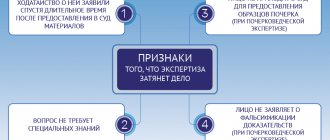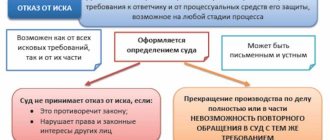Evidence in the arbitration process is information about the facts that is used by the court to establish the presence or absence of circumstances justifying the positions of the parties. They must be obtained in accordance with applicable legal regulations. The definition is contained in Article 64 of the Arbitration Procedure Code of the Russian Federation.
The main feature of the arbitration process is that the parties are business entities. The dispute before the court must also relate to entrepreneurship. And if in a court of general jurisdiction the parties can rely on indirect facts and testimony, then in arbitration, although this possibility is prescribed by the code, in practice preference is given to documentary evidence.
Oral arguments of each party in arbitration will have much less significance than circumstances confirmed in accordance with the law (for example, cash settlement transactions are confirmed only by financial documents, delivery of goods - by invoices or by agreement, etc.).
Proof is of fundamental importance for the arbitration process, since it is on the basis of the information presented that the court makes a decision. The lack of evidence can lead to the refusal to satisfy the plaintiff’s claims or to the satisfaction of the opponent’s claims, and in some cases this result can lead to significant financial losses, bankruptcy and other negative consequences. Therefore, the selection of the necessary documents (including in electronic form), files and records must be approached as seriously as possible.
- The concept and essence of forensic evidence
- Types of evidence in arbitration proceedings
- General classification of evidence in a trial
- Evaluation of evidence in arbitration proceedings
- Facts not subject to proof
- Providing evidence
- The procedure for presenting evidence in the arbitration process
- Features of the assessment of certain types of evidence
The concept and essence of judicial evidence and proof in the arbitration process
Article 64 of the APC provides a clear concept of evidence applicable in the arbitration process. This is information about the facts on the basis of which court decisions are made. At the same time, it is important that they are obtained legally, that is, in compliance with both the APC and other legal acts.
The law does not specify what kind of confirmation must be . Paragraph 2 of Article 64 lists possible options, but their list is not closed. In practice, documents, witness statements, physical evidence, as well as audio-video recordings and photographs are most often used. The opinion of an expert is important if he was involved in the process.
Paragraph 3 of Article 64 of the Russian Arbitration Procedure Code directly establishes that the use of confirmations of a legal position obtained in violation of the law is not permitted. This fact is often used in real trials. During a dispute, one of the parties often tries to prove the fact that the opponent used evidence obtained unlawfully.
The process of proof itself is the sequential presentation of certain facts, documents, statements of positions, and so on. This procedure is no different from that in courts of general jurisdiction.
Other grounds excluding the burden of proof
Art. 70 of the APC is devoted to the issue of recognition of facts: factual circumstances regarding which the parties have reached unanimity are excluded from the burden of proof. Such mutual recognition is recorded in writing in the minutes of the meeting.
Note! The parties' acceptance of the facts is not unconditional. If the judicial authority doubts the integrity of the parties’ actions when concluding an agreement, believing that the purpose of its signing was to conceal real circumstances, it has the right not to accept the confession, due to which the facts will be established and proven in the general manner.
Part 3.1 art. 70 of the APC contains a rule on passive recognition of facts: the absence of a direct objection from the other party, its silence is equated to recognition.
Important! The failure of a party to appear at the meeting is considered as a lack of intention to refute the statements made by the other party, which makes it possible to exclude these facts from the subject of proof and recognize them as established (for example, this position was reflected in the decision of the Administrative Court of the Krasnodar Territory dated October 28, 2015 in case No. A32-25077) .
Not specified in the law, but also exempt from the burden of proof:
- presumptive facts - only statements, but not proof, that are required by the circumstances that make up the content of the evidentiary presumption, in particular, the presumption of guilt of the person who caused the harm, the presumption of good faith of subjects in civil transactions;
- negative facts - statements that something did not happen, for example, that payment for goods was not made, are confirmed by proving the opposite positive fact.
Types of evidence in arbitration proceedings
Article 64 of the Arbitration Procedure Code of the Russian Federation establishes that it is not the facts themselves that are considered evidence, but information about them. Therefore, it is important how exactly this information is confirmed.
The following types of evidence may be used in arbitration:
- written documents (Article 75 of the Arbitration Procedure Code of the Russian Federation). Most often these are contracts, receipts, statements written on paper or electronically, and so on;
- material (Article 76 of the Arbitration Procedure Code of the Russian Federation), for example, some objects, samples;
- conclusions of experts and other specialists (Article 86 of the Arbitration Procedure Code of the Russian Federation). This may be the result of a pre-trial examination, as well as one already carried out as part of the process as directed by the court;
- recordings from video cameras, voice recorders and other devices, including mobile phones;
- explanations of the parties: plaintiff, defendant, third parties (Article 81 of the Arbitration Procedure Code of the Russian Federation);
- testimony of witnesses (Article 88 of the Arbitration Procedure Code of the Russian Federation).
It is important that this list is not closed . If some other evidence can confirm the facts referred to by the party, the court will be able to use it (Article 89 of the Arbitration Procedure Code of the Russian Federation establishes that other documents and materials can be used in the process if they are relevant to the case). But it is necessary that such information be obtained legally. Only in this case will the evidence be considered admissible.
General classification of evidence in a trial
Both in the arbitration process and in others, completely different confirmations can be used. They are distinguished depending on the grounds identified by legal science:
- On the connection between the issue at hand and the evidence itself:
- direct , that is, pointing directly to the desired fact;
- indirect , which do not allow a direct conclusion to be drawn, but partially affect the issue being resolved.
- Depending on the source of formation:
- personal , that is, coming from a specific person. This may be the testimony of witnesses and other participants in the process;
- real , that is, some objects, documents, and so on.
- Depending on the formation process, direct and derivative confirmation can be distinguished. The direct has meaning in itself, indicating some important fact. Derivative – is a consequence of another, that is, it is secondary (for example, a copy of a contract, data from someone’s words, and so on).
During the consideration of the case, various evidence may be used. Forming your position is also possible on the basis of indirect, secondary facts, but greater effectiveness and efficiency is achieved by using direct circumstances that clearly indicate the necessary information.
Before a trial, you need to evaluate what types of evidence will be used to form the correct position. It is important to foresee what the other party may object to the evidence provided. So her position can be challenged.
Another important type of evidence is necessary , that is, those without which it is impossible to satisfy the requirements. They are determined in each specific case individually. For example, this may be an agreement that the plaintiff must attach to the claim if his claims are based on non-fulfillment (partial fulfillment) of the terms of this transaction.
The necessary evidence does not have any advantage over others, but its absence makes it impossible to satisfy the party’s demands. The court simply will not establish the existence of legal relations between the participants in the process; accordingly, all other evidence will not be considered at all.
Evaluation of evidence in arbitration proceedings
The court independently determines whether a particular document, object or, for example, testimony of a party relates to the issue being resolved. In this case, the second party has the right to file a motion to exclude this or that evidence due to the fact that it is not relevant to the case or its use is unacceptable.
The arbitration court evaluates evidence based on its conviction (Article 71 of the Arbitration Procedure Code of the Russian Federation). In doing so, he must fully evaluate the documents, objects or testimony presented. Every piece of evidence used in the process must be evaluated.
Principles for assessing evidence in AP
Paragraph 2 of Article 71 of the Arbitration Procedure Code of the Russian Federation establishes that the Arbitration Court must evaluate:
- relevance;
- admissibility;
- credibility.
After this, the court evaluates whether the evidence presented is sufficient and how connected it is. Only after this the arbitration makes its decision, based on the evidence provided and its assessment.
Article 68 of the Arbitration Procedure Code of the Russian Federation establishes that circumstances that are confirmed by specific evidence cannot be confirmed otherwise. This is the principle of admissibility.
The principle of relevance of evidence is explained in Article 67 of the Arbitration Procedure Code of the Russian Federation. It means that the court accepts only those evidence that actually relate to the issue under consideration. The refusal to accept irrelevant documents or information is noted in the minutes of the meeting (clause 2 of Article 67).
Reliability is defined in paragraph 3 of Article 71. Reliable evidence is one that contains correct information if this is confirmed as a result of verification.
The procedure for presenting and requesting evidence
Evidence must be presented to the court by the parties to the case. If documents are submitted to the court for consideration, then all persons who are parties to the process must receive copies of them.
In a situation where the evidence presented is not enough to make an objective decision, the court may invite the participants in the hearing to present additional evidence. This is necessary to identify facts that allow us to establish the real circumstances of the case.
If the circumstances that must be proven during the court hearing have changed due to the fact that the plaintiff redefined the subject or basis of the claim, or the defendant filed a counterclaim, the court may determine the period within which additional evidence must be presented.
There may be situations when a participant in a case knows that a certain person has important evidence, but it is not possible to obtain it on his own. In this case, he can file a petition for its compulsory recovery. It must indicate what circumstances this will allow to establish. You should also state the reasons for the impossibility of obtaining evidence and describe the place where it is stored.
If a person who has been ordered by the court to provide the evidence required, in the absence of valid reasons, fails to do so, a court fine may be collected from him. The same liability is provided for failure to timely notify the court that evidence cannot be presented by the appointed deadline.
The fact of imposing a fine cannot be considered as a basis for exemption from the obligation to transfer evidence to the court.
Facts not subject to proof
Some circumstances referred to by the court, as well as other participants in the process, do not need to be proven, that is, there is no need to provide any documents, papers, objects or information to confirm their veracity.
Article 69 of the Arbitration Procedure Code of the Russian Federation contains conditions under which the parties are exempt from proof . Thus, the following facts are not subject to proof:
- well-known facts that are beyond doubt;
- facts established by a decision of the arbitration court that has already entered into force. Such information is not subject to repeated proof, since it has already been established earlier;
- facts established by a decision of a court of general jurisdiction that has entered into force, as well as by a criminal court. The rule is similar to the decisions of arbitration courts;
- facts certified by a notary, if there is no reason to doubt their authenticity.
Other circumstances must be confirmed by additional evidence and are not accepted by the courts without it. Simple arguments are not enough if there is doubt that they are not true.
Additionally, you can highlight information that is recognized by both parties to the process. In this case, the court accepts them and evaluates them on an equal basis with other confirmations of the legal position. For example, if the plaintiff attaches a copy of the agreement and the defendant admits that such an agreement was concluded between the parties, there will be no need to demand the original.
What are letters rogatory?
In judicial practice, there are often situations when evidence cannot be obtained by the court because it is located in another region of the Russian Federation. In such cases, the court hearing the case may instruct the court located in another constituent entity of the Russian Federation to carry out the necessary procedural actions. The judicial authority must issue a ruling regarding this decision.
The text of the definition includes (Part 2 of Article 73 of the Arbitration Procedure Code of the Russian Federation):
- a brief summary of the essence of the pending case;
- what circumstances need to be established;
- a list of evidence that the arbitration court in another region has been instructed to request.
A copy of this determination must be sent to the appropriate court. The judicial authority that received it must execute the order within 10 days from the date of its actual receipt of the copy.
The court to which the order is addressed issues a ruling on its implementation. It must be sent to the court from which this order came. The materials that were collected as a result of completing the assignment are also sent with him.
If, due to objective reasons, the order cannot be fulfilled, this must be evidenced in the determination.
Providing evidence
Any interim measures serve to protect certain facts, information or objects. For example, seizure of property, bank accounts, will help preserve the object, save it from encroachment by third parties or destruction (transferring ownership to third parties)
In accordance with Article 72 of the Arbitration Procedure Code of the Russian Federation, the parties have the right to tell the court that without the use of interim measures, the presentation of evidence will be difficult or may violate their rights. If these facts are confirmed by a party, the court decides to apply interim measures in accordance with the rules of Chapter 8 of the Arbitration Procedure Code of the Russian Federation.
The party who indicates the need to apply such measures must prepare and file a petition, which indicates what evidence will need to be provided, how the refusal to provide it may affect the outcome of the case and its preservation, and what significance the evidence has for the final result.
Interim measures can be taken before the start of the trial, in which case the application is submitted along with the statement of claim.
Providing evidence can be implemented in a variety of ways . One option is to contact a notary who will certify the necessary facts. For example, if there is reason to believe that a person will not be able to testify in the future, the applicant may have the statement certified by a notary and then use the document as evidence.
The procedure for presenting evidence (proof) in the arbitration process
The evidentiary procedure in the arbitration process can be divided into several stages, where each is a separate procedural action:
- The subject of proof is determined, that is, the fact that must be confirmed using the document used, object, information, and so on. After this, it is determined what kind of evidence can prove the required fact, how it relates to the case, and whether it is admissible.
- Evidence is being collected. For example, the necessary certificate or extract is issued, a position is formed, and so on.
- The evidence is presented to the court. This can be done either before the start of the trial, for example, by attaching a document to the statement of claim, or already during the trial. In any case, you can provide documents before the court goes to the deliberation room to make a final decision.
- The evidence is examined as part of the process.
- The court evaluates the evidence presented.
After all stages are completed, a judicial act is issued, taking into account all permissible, relevant, legally obtained documents and information.
Features of the assessment of certain types of evidence
Each type of evidence has its own characteristics. It is impossible to evaluate the document and the testimony of a witness in the same way; the court evaluates the received facts and information differently.
Moreover, the assessment differs not only depending on the type of evidence, but also on the basis of the information it carries, the impact on the result, and so on. For example, the original agreement concluded between the parties may not matter if a financial document confirming the fact of payment for the service is not provided, especially if the transaction contains a clause that the relationship is considered to have actually taken place only after the transfer of funds.
The court carefully evaluates various factors, determining not only their admissibility, validity, relevance and legality, but also the extent to which they influence the relationship between the parties.
Peculiarities of assessing written evidence in the arbitration process
Written evidence in the arbitration process is of fundamental importance. Article 75 understands them as contracts, acts, certificates and other documents that contain important information and facts for the case.
Attention! Written evidence can be not only a paper document, but also a digital one, made on any medium, if it is technically possible to confirm its authenticity.
This category also includes minutes of meetings and individual procedural actions, since the information reflected in them will have a direct impact on the outcome of the trial and does not require additional verification or confirmation of authenticity.
When assessing such documents, the court will proceed from the following principles:
- information received via fax or the Internet is recognized as evidence in cases provided for by law (for example, if a document is signed with an electronic signature, then the requirements of the Federal Law “On Electronic Signature” must be observed).
- in the case of sending electronic copies of documents, the court has the right to require the provision of the original (except for cases where the document is signed with an electronic signature);
- documents drawn up in a foreign language must also contain a duly certified translation;
- if the document was issued abroad, it is recognized by the court if it is legalized (in accordance with the instructions on consular legalization, approved by the USSR Ministry of Foreign Affairs on July 6, 1984);
- in some cases, directly provided for by international agreements of the Russian Federation, legalization is not required;
- if not the entire document, but part of it, relates to the case, an extract may be provided;
- the court shall certify copies upon presentation of the originals, if the document has not been properly certified independently. The court may also require the original to be provided for verification.
In practice, written evidence in the arbitration process is fundamentally important. They are often classified as necessary.
Features of assessing the explanations of participants in the arbitration process
A participant in the process has the right to provide to the court information that is known to him, both orally and in writing (clause 1 of Article 81 of the Arbitration Procedure Code of the Russian Federation). Written explanations are attached to the case materials, oral explanations are entered into the protocol. If the information was presented in writing, it is announced during the court hearing.
The court also evaluates the parties’ explanations along with other evidence, but must carefully consider the information presented and evaluate its reliability. This applies to both the testimony of the parties and the testimony of witnesses.
Expertise is of particular importance and is assessed somewhat differently. An expert is always a specialist in a certain field (confirmation of his qualifications is required) and is involved in the process to clarify facts related to the area in which he has special knowledge and skills. An expert is brought in when proof in the arbitration process is impossible without his participation .
Attention! Any party making its own claims, as well as the court itself, with the consent of the parties, can apply for the appointment of an examination. If the examination is provided for by the contract, then the court has the right to appoint it on its own initiative (clause 1 of Article 82 of the Arbitration Procedure Code of the Russian Federation).
The court evaluates the expert's opinion along with other evidence. The peculiarity is that quite often only an expert can establish some facts that are of fundamental importance for the consideration of the case.
Features of the assessment of audio and video evidence and documents, materials in the arbitration process
Audiovisual materials belong to the category of others, which is regulated by Article 89 of the Arbitration Procedure Code of the Russian Federation. They can be classified as evidence if they contain (record) information that is important for resolving the dispute.
The same rules apply to them as to simple documents: they are also stored in the case file and can be returned to the owners after a petition has been filed. The circumstances they contain are used on an equal basis with other types of evidence.
Features of assessing physical evidence
The use of physical evidence is regulated by Article 76 of the Arbitration Procedure Code of the Russian Federation. The legislator includes among them objects, objects, the appearance and properties of which establish factors important to the case.
Physical evidence in the arbitration process can be expressed in different ways. For example, this could be a sample of a part, a part of an object, an entire object, and so on, that is, everything that in one way or another confirms the position of the party.
The arbitration court examines such evidence to the extent that its qualifications allow. If the opinion of an expert in a certain field is required to assess the circumstances, then he can be involved in accordance with the current rules (Articles 82 - 87.1 of the Arbitration Procedure Code of the Russian Federation, Federal Law “On State Expert Activities”).
In order for evidence in the arbitration process to have legal force, it is necessary to follow the general rule, which follows from the analysis of legal norms. Business entities conduct legal relations and acquire rights and obligations in relation to their counterparty or partner only on the basis of properly formalized contractual relations.
Evidence in the arbitration process is important and serves to confirm the factors relied upon by the parties. Only circumstances that are not subject to proof can be accepted by the court without additional justification; in other cases, the parties are required to additionally confirm their position. Considering the fact that the burden of proof lies with the party declaring information, the institution of evidence is fundamental to the process and serves as a tool for obtaining an advantage in the legal position of one of the parties to the dispute when considering the case.
Procedure for inspection and examination of evidence
Features of the inspection:
- an examination of the evidence can be carried out in the place where it is located if it is difficult to deliver it to the court. The court issues a ruling on the decision to conduct on-site research;
- All persons involved in the case are notified of the upcoming inspection of evidence. They must be given precise information about the time and place of the inspection. If these persons were duly notified, but did not appear at the event, this is not grounds for canceling the inspection;
- When examining evidence, photography, video recording or sound recording may be made. If necessary, experts and witnesses are called to examine written or material evidence;
- a protocol is drawn up regarding this procedure;
- if material evidence, due to its natural properties, cannot be stored for a long time due to the fact that it is prone to rapid deterioration, in accordance with Part 1 of Art. 79 of the Arbitration Procedure Code of the Russian Federation are inspected immediately at their location.







